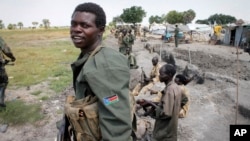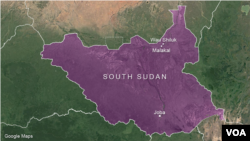Clashes between government and rebel forces in South Sudan’s Upper Nile town of Wau Shilluk over the weekend have forced the International Organization for Migration to suspend its humanitarian operations for thousands of internally displaced people and host communities.
The IOM was in the process of registering thousands of vulnerable people for humanitarian assistance in Wau Shilluk when fighting broke out.
IOM reports the 14-member staff was forced to evacuate to safer areas, with the support of World Vision, which also provides humanitarian aid in the area.
IOM information officer, Olivia Headon tells VOA Wau Shilluk has been relatively calm during the past year. She says this renewed fighting has come as a shock to the inhabitants and has disrupted the agency’s ability to provide critical aid to the displaced and host communities.
“A lot of civilians have moved into the bush from the center of town during the shelling. Others are scared for their lives," Headon said. "So, we hope that this movement towards the bush has been temporary and we already see that some are returning to the town since it has been relatively quiet since Sunday. And, we hope that continues.”
IOM had registered more than 20,000 people for assistance in Wau Shilluk between January 16 and 26. Nearly 3,000 displaced and local residents remained to be registered when the agency was forced to halt the operation.
Headon says IOM has been providing health care, and non-food items, such as hygiene kits for women, clothes and shelter material. She says suspending this operation has serious consequences.
“They are already in an extremely serious situation," Headon noted. " And, then when aid is cut off, it puts them in an even more dangerous situation where you have people who need life-saving assistance not being able to be accessed by IOM and other humanitarian partners.”
Fighting between the government and rebels began on January 25 south of Wau Shilluk. It has continued to spread toward Wau Shilluk and to Malakal town, South Sudan’s oil center, which is home to more than 33,000 displaced people.

